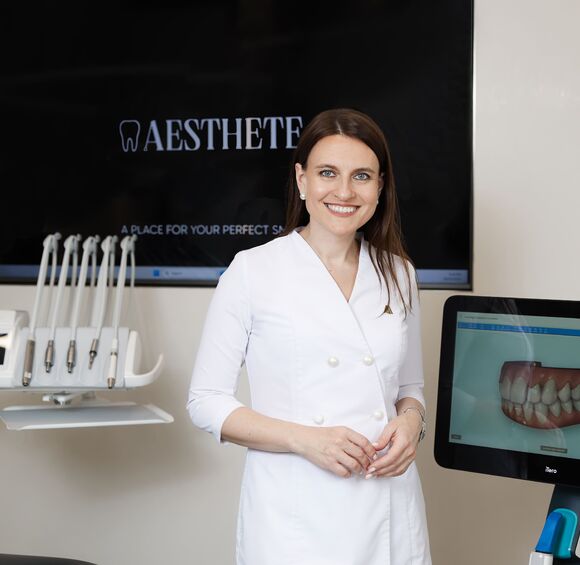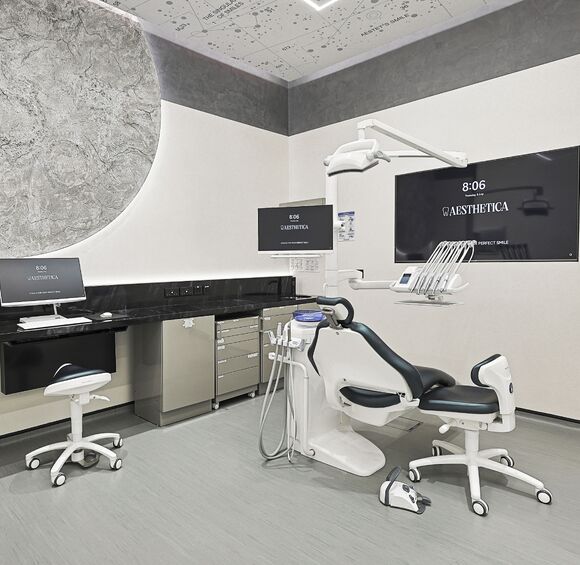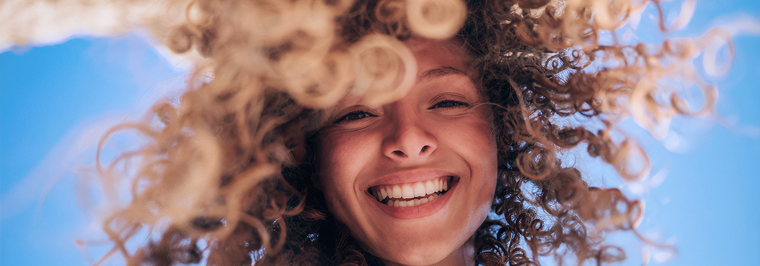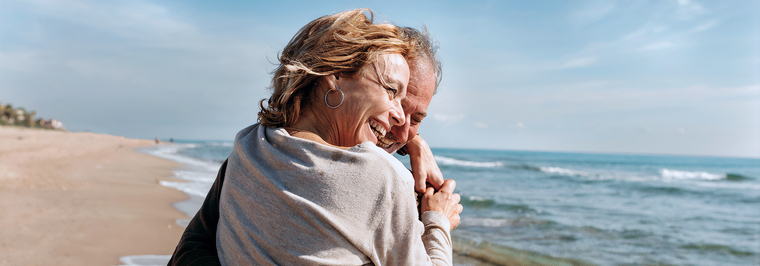The dental clinic AESTHETE is located in Dubai (UAE), on Bluewaters Island. Our doctors use advanced methods for dental treatment and restoration. We offer useful information on how to care for your oral health. In particular, we discuss mouthwashes—what they are, how to use them, and the benefits they bring.
Mouthwash for oral cavity—what is it?
It is necessary to brush your teeth every day, and this should be done at least twice a day, with the brushing duration being no less than two minutes. However, many people brush their teeth no more than once a day, spending only 30-40 seconds, and using unsuitable brushes and pastes. This approach can lead to frequent tooth decay and other dental diseases.
Proper brushing, on the other hand, reduces the risk of developing diseases. It is advisable to use a mouthwash after brushing. This is a special liquid that refreshes breath and improves the condition of the oral cavity.
Several types of such products are available for sale, adapted to the different needs of people.
- For strengthening teeth. The characteristic feature of mouthwashes in this category is the increased content of fluoride and calcium. These products are necessary for the prevention of cavities.
- For preventing tartar formation. These mouthwashes contain calcium citrate, which prevents the buildup of hard deposits on the teeth.
- For the prevention of gingivitis and other inflammatory gum diseases. These products may contain triclosan, chlorhexidine, which slow down the development of pathogenic microorganisms in the mouth.
- For reducing tooth sensitivity. They relieve painful sensations that occur when brushing teeth or due to hot foods or drinks.
- For fresh breath. They eliminate unpleasant odors coming from the mouth. Mint or menthol fragrance refreshes the breath. These products are essential for those who often interact with others and want to leave a good impression.
- For teeth whitening. They eliminate slight darkening of tooth enamel and maintain the whitening effect achieved through professional cleaning.
Many products are versatile and can perform several functions. However, mouthwashes with a clearly defined purpose are the most effective.
All mouthwash products can be divided into three groups:
- Preventive — they prevent the occurrence of diseases;
- Therapeutic — they fight diseases that have already occurred;
- Cosmetic or hygienic — they eliminate bad breath and freshen the breath.
Why is it important to rinse the oral cavity?
Even after thorough tooth cleaning, small food particles remain between the teeth and in other hard-to-reach areas. These particles attract bacteria, and the result of their activity is plaque. Over time, this leads to the destruction of enamel — the outer protective layer of the tooth. Cavities then form, which, if not treated in time, can progress into pulpitis and other serious diseases.
The decay of food particles stuck between the teeth is the main cause of bad breath.

Bacteria also accumulate on the surface of the tongue and the mucous membrane of the gums.
Regular use of mouthwash increases the effectiveness of dental care. The liquid washes away tiny food particles, removes plaque residues that couldn’t be eliminated with a toothbrush, and rinses bacteria from the tongue and gums.
At the same time, the beneficial substances in mouthwashes perform additional functions: for example, they strengthen enamel, refresh the breath, and prevent soft plaque from turning into hard deposits, known as tartar.
Regular rinsing helps prevent gum disease and treats bleeding and inflammation.
Mouthwashes are essential for people who use braces or other orthodontic appliances. They need to be especially careful with their oral care, as food particles can easily get stuck between the teeth and the appliances. Removing them with a brush, even a special one, is very difficult.
Using mouthwash may also be part of medical recommendations. For example, a dentist may prescribe rinsing after a tooth extraction to further protect the postoperative wound in the socket from harmful bacteria.
When to use mouthwash
In most cases, mouthwash should be used after brushing your teeth. However, there are alternative opinions. We will discuss the pros and cons of each approach and highlight important nuances.
Before brushing teeth
Mouthwash loosens plaque and removes some bacteria, making the subsequent brushing more effective. As a result, the likelihood of cavities decreases, and sources of bad breath are eliminated.
On the other hand, many mouthwashes contain components that need to act on the teeth and gums for a certain period of time. If such a mouthwash is used before brushing, the toothbrush with toothpaste, as well as the water used for rinsing, will wash away these beneficial components too quickly.
After brushing teeth
This is the more common option. Mouthwash increases the effectiveness of oral care, providing additional protection against bacteria and plaque formation. It helps clean areas that are difficult to reach with a toothbrush. This is especially useful for people undergoing orthodontic treatment and using braces, aligners, or other similar appliances.
However, in some cases, people use strong medicinal pastes for brushing. These should not be washed off immediately. In such situations, mouthwash can be used only after some time, which may reduce its effectiveness.
Before and after brushing
The question arises whether mouthwash should be used twice, both before and after brushing teeth. This could potentially increase effectiveness.
However, this is not recommended because many active ingredients in these products are beneficial in small doses. Overuse can lead to negative health effects. Therefore, it's important to check how many times per day you can use the chosen mouthwash. This information is usually provided in the instructions or on the label. Typically, it’s not recommended to rinse more than 2-3 times a day.
Are there alternatives to mouthwash?
Some traditional remedies are also suitable for oral care. These primarily include solutions based on herbal extracts, such as sage, mint, and chamomile. They have a mild anti-inflammatory and soothing effect.
In cases of gum inflammation, a temporary relief can be achieved with a solution containing salt and baking soda.
Some oils help eliminate toxins from the oral cavity and additionally strengthen the gums.
However, it’s important to understand that these alternatives are much less effective than mouthwash. Such remedies are ineffective if there are specific needs, for example, if the goal is to strengthen tooth enamel or restore the lost whiteness of your smile.
Common mistakes when using mouthwash and how to avoid them
- At first glance, it may seem that using mouthwash is simple. However, there is a risk of making mistakes that can reduce the effectiveness of the procedure or render it completely ineffective.
- It is important to choose a mouthwash that suits your needs. Determine what is most important for you: cavity prevention, freshening breath, protecting gums from inflammation, or something else. If you are unsure which option to choose, discuss it with your dentist.
- Not all products are universal. Some mouthwashes are not suitable for children and pregnant women. They may contain alcohol or aggressive substances, so you should pay attention to the ingredients to avoid harming your health.
- Children should not use such solutions at all. The minimum age to start teaching a child to use special mouthwashes after brushing their teeth is 6 years. You should supervise them to ensure they are doing it correctly and, if necessary, guide and advise them.
- Use the mouthwash according to the instructions provided. Typically, you should rinse for at least 30 seconds, otherwise, the product won’t work effectively.
- Use the recommended amount of mouthwash to avoid potential negative health effects and reduce waste. For adults, the usual amount is 15-20 ml — about four teaspoons. For children, 5 ml is usually enough, unless otherwise specified in the instructions. For convenience, some manufacturers offer the bottle cap as a measuring cup.
- Use the product for the recommended duration. For example, antibacterial mouthwashes kill both harmful and beneficial bacteria. Therefore, prolonged use of such mouthwashes can lead to dysbiosis. In any ambiguous cases, consult your dentist.
- After using mouthwash, don’t rush to rinse your mouth with water. It contains active ingredients that should remain in contact with your teeth and gums for a while. It’s better to avoid eating or drinking for about 30 minutes after the procedure.
If you are using the product for the first time and it seems too intense, dilute it with water. Moreover, some products are meant to be diluted. This will be indicated in the instructions and on the label, so make sure to read the information carefully.
- Try to rinse your mouth in such a way that the liquid reaches the interdental spaces and washes away any particles stuck there.
- Swallowing mouthwash is not recommended. If a child is using it, explain that it is not for drinking. The ingredients may cause discomfort in the esophagus, and there could also be an upset stomach or intestines. If you swallow the liquid, drink plenty of plain water. If you feel nauseous or develop diarrhea, consult a doctor.
- Some products contain ethyl alcohol. They provide a good antiseptic effect, but frequent use can cause dry mouth and irritation of the mucous membranes. This increases the risk of cavities. If you experience this issue, you may want to choose a mouthwash that does not cause discomfort.
How to get more benefits from mouthwashing
Choose the right product. If needed, consult a dental hygienist or another healthcare professional who can help you make the right choice.
Carefully review the action spectrum of the mouthwash you plan to use. Check how long it can be used. Some preventive mouthwashes should only be used for 2-3 weeks, after which a break is required. Therapeutic mouthwashes can often be used until the desired result is achieved, but there may also be limits to avoid issues like loss of sensitivity or taste perception. Therefore, always read the instructions carefully.
The mouthwash will not replace brushing with a toothbrush and toothpaste. It enhances the effectiveness of oral care, whether you use it before or after brushing. However, without mechanical plaque removal, it will not provide the desired result.
Use the product correctly. There are two common approaches:
- Rinse your entire mouth for 30 seconds or a little longer.
- Divide your mouth into four zones and rinse each zone with small portions for 5-7 seconds.
Spit the solution into the sink after use.
Before rinsing, it is recommended to swish the solution several times through your teeth. This is especially important when using a product with ingredients that strengthen tooth enamel.
If you're just starting to use mouthwash, don't worry if you can't keep it in your mouth for 30 seconds right away. It will take some time to get used to it, but try to aim for this duration. You can count to thirty in your head or use a timer.
It is important that mouthwashing becomes an integral part of your daily oral care routine. This can be done at home, at the dacha (country house), on a business trip, or during a tourist journey. Consistency is key. Regular use of the product helps achieve the results you are aiming for: strengthening tooth enamel, improving gum health, and eliminating bad breath.
Referense
- Home oral care. American Dental Association.
- Taking care of your teeth and mouth. National Institute on Aging.
- Eat right for a healthy mouth and teeth. Academy of Nutrition and Dietetics.
- Gandini, S.; Negri, E.; Boffetta, P. et al. Mouthwash and oral cancer risk – quantitative meta-analysis of epidemiologic studies. Annals of Agricultural and Environmental Medicine , 2012, 19: 173–180.














